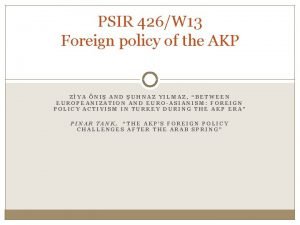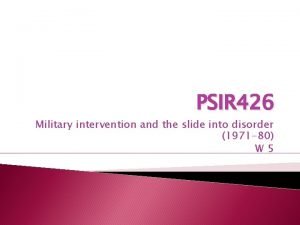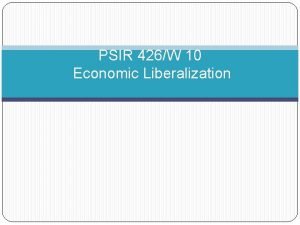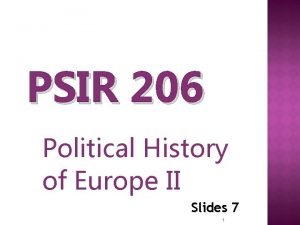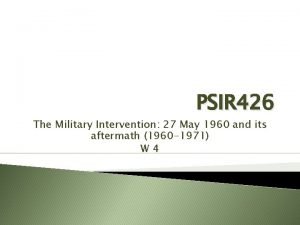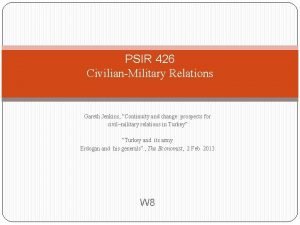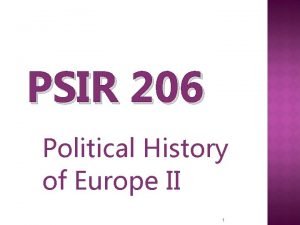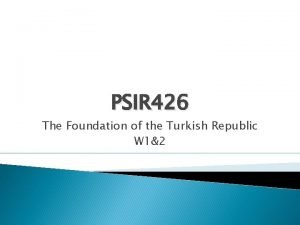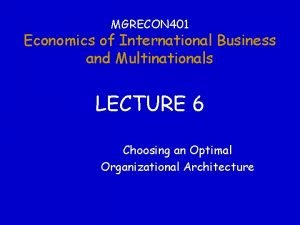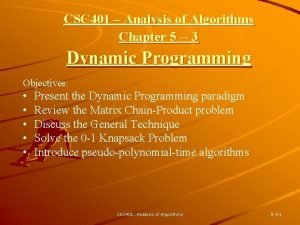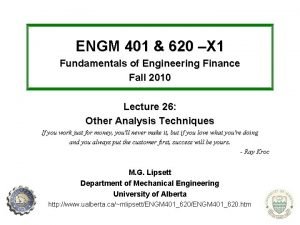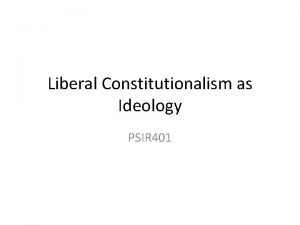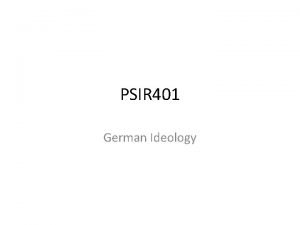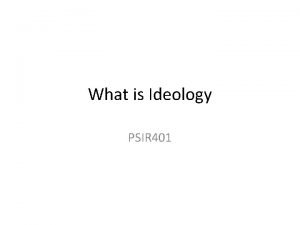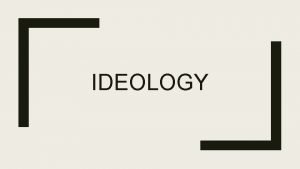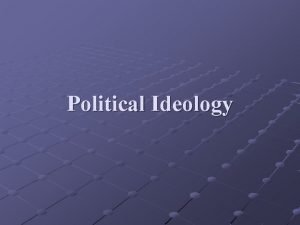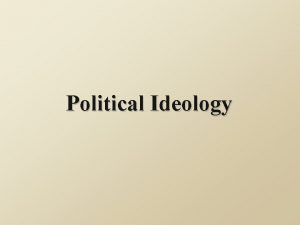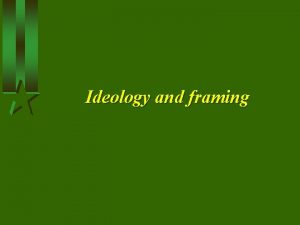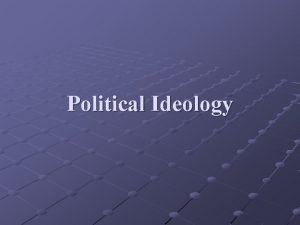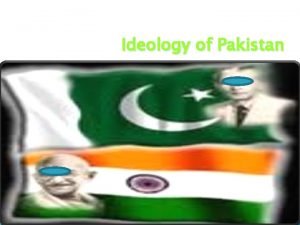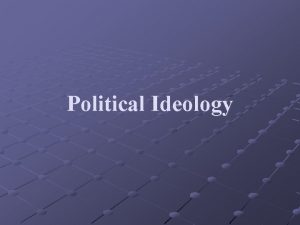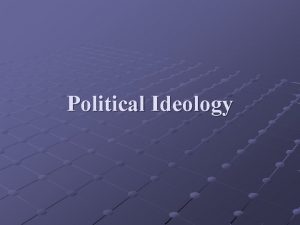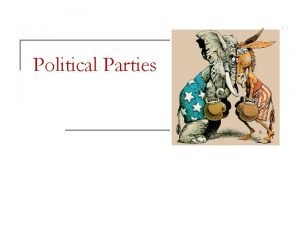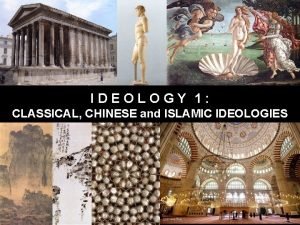PSIR 401 Week 2 Sartori Ideology for the













![• "A person's [belief] system is open or closed. . . [to] the • "A person's [belief] system is open or closed. . . [to] the](https://slidetodoc.com/presentation_image_h2/ca98547410694e986b05e6b2278772cb/image-14.jpg)



- Slides: 17

PSIR 401 Week 2 Sartori

Ideology • for the political scientist the term ideology points to a cluster concept, i. e. , belongs to the concepts that bracket a variety of complex phenomena about which one tries to generalize; and the growing popularity of the term has been matched, if anything, by its growing obscurity

Do we need to use ideology in analysi`? • one is entitled to wonder whethere is any point in using "ideology" for scholarly purposes. • And my specific question will be whethere is a technical meaning, or meanings, of "ideology" which constitute a necessary tool of enquiry for a science of politics.

• Discussions about ideology generally fall into two broad domains, namely, ideology in knowledge and/or ideology in politics. – whether, and to what extent, man's knowledge is ideologically conditioned or distorted – whether ideology is an essential feature of poli tics and, if so, what does it explain

• "ideology" is contrasted with "truth, " science and valid knowledge in general; • ´whereas in the second case we are not concerned with the truth-value but with the functional value, so to speak, of ideology

What does ideology explain about the nature of politics • First, there is no object in adopting new terms unless they are employed to cover new phenomena or new sets of observations. • We are required to conceive ideology as a dimension or an aspect of politics which may, or may not, be found to apply to the real world. For this purpose "ideological politics" will be opposed here to "pragmatic politics, " i. e. , pragmatism will be used as a designation for non-ideology

• Ideology is generally qualified by how it relates to idea, belief, opinion, creed, myth, utopia, ethos, and similar or derivative concept. • the relation between ideology and "idea" (i. e. , conceptual thinking) bears on the genesis of ideological doctrines, on how they originate and are born, and is eventually condu cive to an epistemological discussion.

• the structure and function of ideologism. – Structure: how one believes – Function: the efficacy, or effectiveness, of belief systems

THE IDEOLOGICAL MENTALITY • If ideology is linked to "belief, " it is readily apparent that the general class is "belief systems" and that ideology is the narrower conceptualization • a political belief system consists of the set of beliefs according to which individuals navigate and orient themselves in the sea of pol itics

• It is not sufficient to say, however, that ide ology is the political slice, or part, of a belief system • By definition, then, not all political belief systems are ideological

• pragmatism is also a state of belief systems. Indeed to contrast ideologism and pragmatism as representing, respectively, a belief versus a belief-less orientation toward politics is to preempt the issue from the outset. • The first corollary is, therefore, that both ideologism and pragmatism are possible states of belief

• the presence of beliefs does not suffice to qualify, per se, the ideological nature of such beliefs: the pragmatic actor also is belieforiented.

• a belief is neither an opinion nor an idea. • "ideas that are no longer thought” • beliefs are idea-clus ters that routinize the cost of decisions precisely because they are taken for granted. Beliefs are believed-not explored, tested and held under the searchlight of consciousness
![A persons belief system is open or closed to the • "A person's [belief] system is open or closed. . . [to] the](https://slidetodoc.com/presentation_image_h2/ca98547410694e986b05e6b2278772cb/image-14.jpg)
• "A person's [belief] system is open or closed. . . [to] the extent to which the person can receive, evaluate and act on relevant information. . . on its own intrinsic merits. ” • The closed mind is defined, accordingly, as a cognitive state in which a person does not discriminate substan tive information from information about the source. Hence the more closed one's belief sys tem, the more he is unable to evaluate relevant information on its own intrinsic merits

Rationalism and ideology The rationalistic processing-coding tends to approach problems as follows: i) deductive argumentation prevails over evidence and testing; ii) doctrine prevails over practice; iii) principle prevails over precedent; iv) ends prevail over means; and v) perceptions tend to be "covered up, " doctrine-loaded, typically indirect

Empirical and ideology • the empirical processing-coding can be described as follows: • i) evidence and testing prevail over deductive argumentation; • ii) practice prevails over doc trine; • iii) precedent prevails over principle; • iv) means prevail over ends, and, therefore; • v) its perceptions tend to be more "direct. "

A Framework for Analysis • Thus far the analysis has been confined to a single dimension-cognition. But beliefs and belief systems vary not only along a cognitive but also along an emotive dimension.



